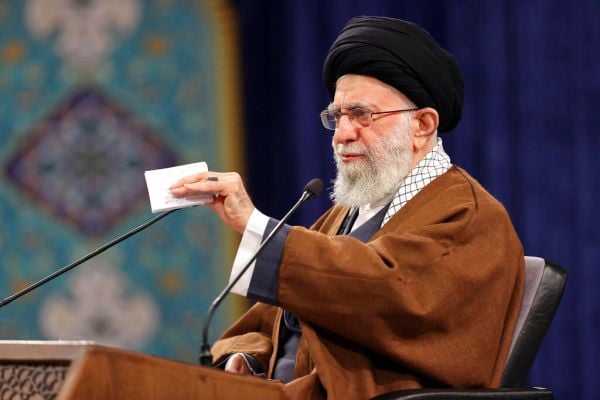By Jonathan S. Tobin
(JNS) This past weekend’s Iranian missile attack on Israel was, among other things, a wake-up call for Congress. More than six months after Oct. 7, a bill that would provide supplemental military aid to the Jewish state that would help it fight the Hamas terrorists responsible for the massacres and defend itself against Iran is still languishing on Capitol Hill. And while the number of those who oppose helping Israel has increased in the intervening months, the reason why passage of the measure is still very much in doubt is not entirely the fault of the growing number of Democrats who have turned on the Jewish state.
The problem is Ukraine.
In February, after months of wrangling over foreign aid, a bipartisan majority in the Senate passed a $95 billion assistance package. It has not come to a vote in the House of Representatives because much of the Republican caucus objected to the decision of President Joe Biden andSenate Minority Leader Mitch McConnell to link their favorite cause—funding Ukraine’s war against Russia—to something that almost all Republicans and most Democrats backed: assistance for Israel. Because most of the slender House Republican majority opposed the idea of doubling down on a blank check to maintain the stalemate in the Ukraine-Russia war, the only way to get around that would be to force their hand by making it the only way Israel could also be helped.
They did that by tying a massive $60.1 billion in additional assistance to Ukraine to a smaller $14.1 billion allocation to Israel, plus $9.1 billion in aid to various humanitarian causes, including Gaza, and $4.83 billion to Taiwan. They argue that the war begun by the illegal and brutal Russian invasion of Ukraine is part of the same struggle as Israel’s fight for national existence against a genocidal Palestinian terrorist movement.
A political impasse
Indeed, the rhetoric backing the omnibus aid bill conjures up that of the Cold War, an era in which supporters of Israel were happy to link their cause to that of the West’s fight against Soviet communism. But while there is considerable and understandable sympathy for Ukraine—and very little for the Russians, even among those skeptical of the embrace of Kyiv’s cause—the notion that the two conflicts are related other than as pawns in a Washington political battle is a pernicious myth. That’s something that supporters of Israel—on either side of the aisle—need to understand if they are to break the impasse and get the Jewish state the military aid it needs.
The political problem involved in the aid standoff is just as complex and in some ways contradictory as the U.S. stand in both conflicts.
Democrats are split on supporting Israel. A growing number of so-called “progressives” have joined with the openly antisemitic members of the left-wing “Squad” and grassroots party activists to oppose any aid to the Jewish state.
Meanwhile, Republicans are split on Ukraine. McConnell and the older establishment wing of the party are ardent supporters of the Ukraine war. Most House Republicans and most grassroots GOP voters believe that more funding to continue a war that clearly can’t be won and has no end in sight is a terrible idea. They believe that is especially true considering that Washington is doing nothing to deal with the open border disaster created by Biden’s policies that have let between 7 million and 10 million illegal immigrants into the country.
House Republicans want to pass a separate, “clean” aid bill for Israel and let aid to Ukraine pass on its own merits. Although there is a majority for Israel aid on its own, Biden has threatened to veto such a bill if it doesn’t also include the much larger allocations for the Ukrainians and the Palestinians. The GOP would need a two-thirds majority to override it. And they don’t have it.
If that wasn’t confusing enough, the Biden administration is afflicted with what might well be described as a case of schizophrenia. It has helped defend the State of Israel against Iranian missiles while at the same time using threats and diplomatic pressure to prevent it from finishing the job of eliminating Hamas in the Gaza Strip, even though the president had initially stated his support for that goal. That means that the administration is pushing for the passage of aid to Israel even though it’s also threatening to cut that aid if Israel seeks to win the war.
Aid urgently needed
The attack of more than 300 missiles and drones launched by Iran late Saturday night has lent new urgency to the effort to address Israel’s military needs. Jerusalem is almost completely dependent on the United States for the resupply of arms and ammunition—not only for the war against Hamas but for the anti-missile defense required to fend off Iran and its other major proxy, Hezbollah to the north. But House Republicans—most of whom are lockstep supporters of Israel—do not take kindly to what they consider to be a dirty trick on the part of Biden. They regard the money for Ukraine as a poison pill they not only won’t swallow but also a sign of whether their leader—House Speaker Mike Johnson—has been co-opted by what many conservatives consider to be the inside the Beltway “uniparty,” rather than serving the interests of GOP voters.
Right now, most of the drama concerning this standoff centers on Johnson, who already has the unenviable job of trying to manage the unruly House with a razor-thin, one-vote majority. The current caucus rules enable any one member to “vacate the chair” or put the speakership up for another divisive vote, such as the one that opened this session of Congress in 2023 and then again later last year when Speaker Kevin McCarthy was ousted in what was widely derided as a dysfunctional congressional clown show. With Rep. Marjorie Taylor Greene (R-Ga.) an unpredictable extremist who opposes Ukraine while supporting Israel aid in principle (and who is best known for voicing antisemitic tropes about “Jewish space lasers”) threatening single-handedly to take down Johnson over Ukraine, chaos in Congress looms.
Johnson has the advantage of the support of former president and certain 2024 GOP presidential nominee Donald Trump, who wants aid to Israel but is also a Ukraine skeptic. If, as sometimes appears to be the case, Johnson has succumbed to pressure from party establishment figures and lets the combined aid package come up for a vote, he hasn’t a prayer of retaining the speakership.
His solution is to have separate votes on Israel and Ukraine. He also thinks any money to the latter should be a lend-lease loan rather than direct aid, though it’s unclear why anyone believes it could ever be paid back. The Democrats aren’t likely to go along with that plan, and when the dust settles, neither Israel nor Ukraine will get anything out of this.
This mess exasperates the pro-Israel community. Any aid bill that provided the money needed to cope with Israel’s extraordinary military needs since Oct. 7 (although almost all of it will be spent in the United States, making it as much of an aid bill for the American arms industry as one for Israel), would be welcomed in both Jerusalem and by pro-Israel groups. And as far as they are concerned, if the price of obtaining what is needed is to tie the Jewish state’s dilemma to that of Ukraine, then so be it.
This is a mistake, both in terms of politics and policy.
Some in the pro-Israel community support the narrative about Israel and Ukraine being part of the same struggle against international villains. This is wrong. Both Russian President Vladimir Putin and Hamas are bad guys, but the Cold War is over.
Myths about Ukraine
Russia’s invasion of Ukraine was both illegal and immoral, but the notion that Moscow’s current intentions are remotely comparable to the Stalinist goal of worldwide Communist domination is risible. Putin may dream of reconstituting the Soviet or Tsarist empires, but that is mere braggadocio. The current Russian Federation is a shadow of its predecessors—a corrupt failed state with oil money but saddled with an incompetent army that proved incapable of achieving Putin’s goal of conquering Ukraine in the first months of the war. Their only goal now is to hold onto Crimea and the parts of Eastern Ukraine that Russia seized in 2014 when neither President Barack Obama nor anyone else in the United States thought it was worth getting worked up about.
The war in Ukraine has settled down to a World War I-style trench warfare stalemate that Kyiv can’t possibly win. The United States should be pushing for a negotiated end to the conflict. That won’t satisfy those who want to see Putin punished, but neither Biden nor McConnell—or anyone else—can explain how they plan to defeat a nuclear power. Contrary to the hero’s treatment the West has given Ukrainian President Volodymyr Zelenskyy, his government isn’t much more democratic or a defender of freedoms than Putin’s. Yet Americans are still expected to foot the tab for a war Washington seems to be intent on escalating, such as last summer’s disastrous offensive that merely added to the growing toll of lost lives and destruction in an already devastated country.
Assistance to Kyiv is also going to a corrupt government with little of the accountability required for Jerusalem. Some criticize the annual $3.8 billion military-aid package to Israel as too much money. However, in just the last two years, Congress has committed to sending Ukraine $113 billion. With the extra $60 billion Biden wants to add, Kyiv would have sums that would far exceed all of the U.S. aid ever given to Israel.
Double standards
Moreover, Biden has never sought to limit or second-guess Ukraine’s military efforts against its foes or questioned how many civilian lives are lost in the course of either self-defense or offensives aimed at seizing back territories that include Russian speakers, who may not be longing to be ruled by Zelenskyy any more than Putin. Nor has he tried to stop them from firing into Russian territory. Yet he is determined that Israel not defeat Hamas and is equally intent that it not retaliate against Iran for launching missiles at the Jewish state. Restraint is the only course of action America ever thinks is appropriate for Israel. That’s not a word Zelenskyy ever hears from Washington.
That’s not merely unfair. It’s also a symptom of the double standard that is always used to judge Israel—a country that can’t afford to lose a war, lest it be subjected to genocide, but that is never allowed to win one.
While completely abandoning Ukraine while it’s still fighting Russia isn’t an option, a commitment to a forever war is equally untenable.
Friends of Israel ought not only to reject the false equivalence put forward about Israel and Ukraine. They should understand that an endless commitment to the war in Ukraine is so costly that it will, in the long run, make it impossible for America to defend other interests elsewhere. The United States doesn’t manufacture enough weapons, including sophisticated air-defense systems Ukraine wants in quantities that far outnumber Israel’s needs, to satisfy Kyiv’s needs—let alone those of Israel, Taiwan or any other U.S. defense requirement. Sen. J.D. Vance (R-Ohio), a Ukraine skeptic, isn’t wrong to note that it’s nothing less than a “fairy tale” to pretend it can do so in the foreseeable future.
Public discourse about foreign aid has become toxic. Any pushback about the myth of Ukraine being a bastion of liberty that must be given unlimited funds is wrongly smeared as the work of a Putin puppet. Support for Israel to fight Islamists who hate the West as much as they do Jews is termed “pro-genocide” by the left-wing base of a Democratic Party indoctrinated in toxic woke ideologies of critical race theory and intersectionality, which falsely brand Israel and Jews as “white” oppressors.
Expecting a dysfunctional Congress to sort out these complex issues while wars are being fought in real time may be asking too much. Still, those seeking separate votes on aid to Israel and Ukraine are correct. The only link between the two causes is a political tactic on the part of the White House. Were it not for the injection of Ukraine into the conversation, military assistance to Israel would have been passed by Congress months ago. It’s time to end the stalemate by letting each cause have an up or down vote. If that happens, Israel will likely get the help it needs against Hamas and Iran. Without it, the Jewish state will be left in the lurch.
Jonathan S. Tobin is editor-in-chief of JNS (Jewish News Syndicate). Follow him: @jonathans_tobin.















